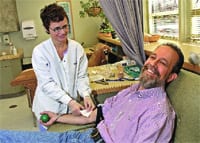The Importance of Choosing Your Care
Healthcare is undergoing rapid change today, affecting hospitals, physicians, and patients in many ways. These changes — from what is covered by insurance to how patients receive care from their physicians — are making the healthcare system increasingly complex, raising questions and confusion for patients.
How to simplify the process, get answers, limit the confusion, and obtain good, quality care are key elements patients should consider when choosing their healthcare.
The first critical step in that process is selecting a primary-care physician, someone whom you will see on a regular basis, will coordinate your care, and will help guide you through the healthcare system. Having a primary-care physician is important because health screenings should occur at every age, and as one gets older, the screenings — such as colon-cancer screenings and mammograms — become more important.
How you choose a physician, however, isn’t as easy as picking a name from a directory. Every physician has pluses and minuses, and the goal should be to choose someone with whom you can build a relationship based on mutual trust. Simply stated, two-way trust and communication form the bedrock of a physician-patient relationship that leads to good medical care.
When picking a primary-care physician, first figure out what is important to you. The basics should apply. Location, accessibility, hours the office is open, staff coverage when the doctor is unavailable, affiliation with medical facilities that you might want to go to should you need to be hospitalized, and whether the physician accepts the insurance you have are all factors that should be considered.
A primary consideration, however, should be finding someone you can trust to give you high-quality care and help you maneuver through the healthcare system.
How do you find such a person? Take time to do some research. Start by asking family, friends, or trusted colleagues — people who have experience and relationships with doctors can often be the best source of information. Also, examine physician profiles from such places as websites of hospitals and the state Board of Registration in Medicine. These can tell you what areas the physician may specialize in, such as geriatric care for senior citizens, if they are board-certified, and if any disciplinary actions have been taken against the doctor.
Many other websites evaluate and rate physicians, but these should be used with caution. While some sites can provide useful information, all have limitations. Data about the use of electronic medical records, experience of staff, and behavior of office personnel, for example, may be sparse or nonexistent. And many sites don’t give information on the composition of the physician’s patient population. For example, are most of the physician’s patients older or younger? Are most relatively healthy, or are they ill with chronic conditions?
Patients should also be aware that a shift is taking place in the way healthcare is being delivered today, with more care being delivered by teams of professionals. As more people gain health insurance, more are seeking care, so nurse practitioners, physician assistants, and other individuals are now providing care under the supervision of a physician.
What happens if you select a doctor and then discover you don’t like him or her or feel you’re not getting proper attention or good care? Talk with your doctor. In some cases, the problem may just be miscommunication or misunderstanding. Most physicians will listen and appreciate your honesty.
If, however, you believe a change is needed, then make a change. Every physician is different, every patient is different, and occasionally a mismatch occurs. That’s not a bad thing. As a patient, you want to make sure you have the opportunity to develop a trusting physician-patient relationship that’s so essential to good care.
I can’t emphasize enough that good medical care is based on a trusting physician-patient relationship, with honest, two-way communication. Medicine is both an art and science, and part of the art of medicine is for the physician to get to know and trust the patient and for the patient to know and trust the doctor.
For more information, visit the Mass. Medical Society at www.massmed.org. For a video discussion, visit www.physicianfocus.org/choosingcare.


Comments are closed.